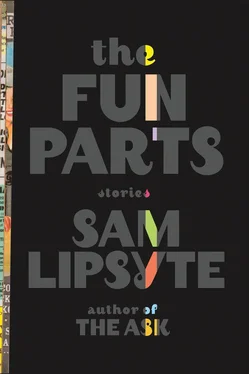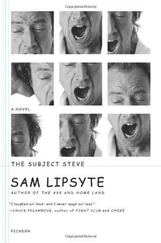The Rickenbacker was even heavier on the walk home, but life is funny, because as I shoved the guitar back into Gary’s closet, I kicked over a rotted duck boot and a wad of bills rolled out. It was as though Gary secretly wanted me to hijack his property and try to pawn it or else just steal money from him outright. I went up the street to the doorway where the huge man stood in his leather vest and leather half gloves and two leather fanny packs under his enormous belly. One fanny pack had the boy, the D, the dope. The other had the stuff we agreed to call the girl, the coke, though sometimes it was just powder for helping babies poop.
This guy had stabbed a customer several weeks ago, but he was always pleasant with me. I liked this spot. It was safe and convenient. It beat Cups. Cups was a few blocks away. Bad things happened at Cups. I preferred Fanny Packs.
“Thanks,” I said.
Gary was still not home, so I sat on the futon and tried to focus on some basic facts about Marvelous Marvin Hagler. I remembered a lot, but I needed to remember more. I wondered if my stepmother had ever delivered on her threat, thrown out those boxing magazines. I needed to do some research, and I didn’t even know the location of the nearest library. The only books I read were the ones I found near trash bins. Right now I was muscling through an anthology of Korean poetry and a tract on management theory from the early 1970s.
I called my father, and my stepmother answered.
“Hey,” I said. “Remember those boxing magazines we used to have? Like crates of them?”
“Why, you want to shoot them in your arm?”
“Please,” I said. “You’re not being fair.”
“I’m not being fair?”
“I’ve made some mistakes. I’ve changed. I’m doing research for a book project, believe it or not.”
“Not.”
“It’s about Marvelous Marvin Hagler.”
“Who’s that?”
“You should know. You’re married to a sportswriter.”
“I’m married to a carrot.”
“A what?”
“A zucchini.”
“You’re drunk.”
“A vegetable medley. That’s your father. Your mother was lucky to get out.”
“Put him on,” I said.
“Your father?”
“Yes, put him on.”
I heard some fumbling, some hard breathing.
“Dad?” I said. “Is that you? Can you hear me? It’s me. Your son.”
The breathing softened, a distant surf.
“Dad,” I said, “Marvelous Marvin Hagler. Any thoughts? Didn’t you cover a few of his fights?”
“Yeah. I fucked her after the fight,” said my father. “It was the road. That’s how we did it.”
“No,” I said. “Hagler.”
“Name your price, Chief.”
There was more fumbling, and I heard my father say, “Sales call.”
My stepmother came back on the line. “How’s the research going?”
“Well,” I said, “if you find any magazines…”
“Don’t worry,” said my stepmother, “I won’t.”
* * *
Maybe I could meditate, trek deep within myself. Perhaps some truths about Marvelous Marvin Hagler lay entombed there, along with memories of my mother before she got sick and my father before he left her and got married and then got married again and then started to forget everything, such as his son and his wives and the rare fury of Marvelous Marvin Hagler. For instance, here was an indelible fact: Hagler’s mother never called him Marvelous. He added that, legally, later.
Then again, maybe the point of this book wasn’t facts at all. Children didn’t need facts. Children needed books for boys about gritty people who struggled and triumphed over steep odds. Maybe my next book would tell the story of me. I had been struggling, but now my hour of triumph had arrived. Triumph was about to caress my shoulders, coo into my ear. I didn’t even know if triumph was a man or a woman, or if this was my way of battling God in my mind.
I went out to the street and found somebody who knew the location of the nearest library.
* * *
We met for drinks at an outdoor café on a gritty, struggling side street in midtown. They had umbrellas over the tables so you could squint and maybe pretend you were somewhere pretty. I took a seat and ordered an Irish coffee, the closest thing to a speedball on the menu. Some mounted cops sauntered by, eyed me as their roans pinched off hot loads near the curb.
Those bright, mulchy mounds, they looked so full of life, the excess of life.
Cassandra had described herself with the usual telephonic vagueness, blondish this, bluish that. I had a corner table, a good view of the café, so I jumped when I felt a hand on my neck.
“It’s me. Cassandra.”
She was a less delicate version of her brother. A much older man in a charcoal suit stood beside her.
“Hi,” I said, half stood. “Please, have a seat. How did you recognize me?”
“Wasn’t hard.”
“I’ll take that as a compliment.”
“I’m sure you will,” said Cassandra. “This is Timothy. He’s our editor in chief. When I told him about your idea, he really wanted to come along.”
“The more the merrier!” I said.
“Hello,” said Timothy. He spoke tightly. I sensed awkwardness between them, perhaps a dispute about who would bask longer in the reflected glory of my publication.
Cassandra ordered iced teas.
“So,” she said. “About this book thing.”
I knew this was my moment. This was the way of the world, the opposite of the way of our apartment. You had to speak your dream. It wasn’t enough to do a thing. You had to sell the notion of doing it. This was what they meant by the marketplace of ideas.
“The book,” I said. “The book. It is for children, as you know, for all children, but with an emphasis on the boy. Because there are no stories for the boy. Stories for the girl are too sweet and sticky. Everything’s a colossal lie about bunnies and rainbows and butterflies. But the boy needs the truth of us as meat, to bathe in the blood of our meat war.”
Timothy squinted in his ice-cream chair.
“I think I know what you mean,” said Cassandra, “but I’m not sure I would put it that way.”
“You’re the expert,” I said, drank down the rest of my Irish coffee. It really didn’t compare.
“Yes,” said Cassandra. “I am.”
“I’m just the lowly writer,” I said. “The humble scribe. But I do know one thing. Marvelous Marvin Hagler is somebody the boy would do well to remember. As an exemplar. Hagler grew up poor in Newark, New Jersey, where he witnessed the ’68 riots firsthand. A social worker helped move his family to Brockton, Massachusetts. Do you know who that social worker was? The mother of the revolutionary poet and playwright Amiri Baraka. How is that for doozy-grade historical confluence.”
“Amiri Baraka?” said Cassandra.
Timothy looked rather ashen.
“These are the facts. That’s all. I went to the library. They’ve got something called microfiche. One night in Brockton young Marvin is beaten up by a local tough named Dornell Wigfall. The next day, Marvin goes to the gym. The rest is legend. He shaves his head and becomes the fighter nobody wants to fight. Finally he gets his title shot, from a Brit called Minter. Minter says no black man will ever take his belt. So Hagler flies to Albion’s shores and gives that limey a New England beat down. The crowd throws bottles into the ring. Hagler flees for his life. It’s victory, but a tricky kind of victory. He has many more celebrated bouts. Sugar Ray Leonard. Roberto Duran. His third-round KO of Thomas ‘the Hitman’ Hearns, the Kronk Gym prodigy, is considered by many to be—”
“Stop!” cried Timothy. “What are you doing?”
“Daddy, please,” said Cassandra.
Читать дальше












